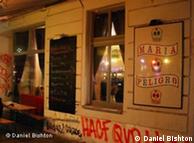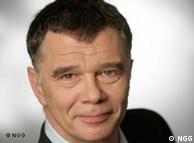Labor Market | 07.12.2011
Berlin's creative community wary of minimum wage
Berlin has long been a hub of European subculture. The city attracts hordes of artists, musicians and creative entrepreneurs, beckoned by the cheap living costs and teeming nightlife. Combined with a huge turnover of tourists, this translates into an incredibly young, transient population with high levels of unemployment. Many young people who migrate to the city find themselves working low-wage cash jobs without employee benefits - and struggling to sustain their creative aspirations.
Twenty-four-year-old Bianca Lean is an Australian visual artist who moved to Berlin in 2009. Since then, she has worked a range of low-wage positions to stay afloat and support her art career. After six months in Paris, she decided to move to Berlin because of its wealth of independent galleries and low cost of living.
She initially secured an internship at a marketing company, plugging search engine optimization keywords into Google for 3.50 euros ($4.70) an hour. She also worked weekends at a bar for four euros an hour. Her hours ranged from none in a week to consecutive 15-hour shifts.
Later, Bianca worked as a baker for two different businesses after quitting her previous jobs. She was paid under the table in cash and was able to pay her rent and live quite comfortably. But working 12-hour shifts, up to six days a week, left no time for her art. Young artists often tend to work at restaurants and bars"It's a Catch 22 - now I have enough money to go traveling or do anything I want to, but I still haven't created any work out of it. I've had one exhibition and quite a few bits and pieces (…) - but it's not what I expected I would have been able to accomplish," she said.
Young artists often tend to work at restaurants and bars"It's a Catch 22 - now I have enough money to go traveling or do anything I want to, but I still haven't created any work out of it. I've had one exhibition and quite a few bits and pieces (…) - but it's not what I expected I would have been able to accomplish," she said.
Stories like Bianca's are commonplace, particularly among artists looking for side jobs while focusing on their true passion. Germany is one of only seven EU nations without a binding minimum wage. Instead, it has a set of union-negotiated "wage floors" for some industries - which vary from state to state - and no minimum at all for others.
Although unemployment as a whole dropped to its lowest level in 20 years in September 2011 - with less than 2.8 million Germans without work - the number of negotiated salaries in low-wage jobs has dropped just as significantly over the past year, according to figures from the Hans Böckler Foundation. This figure is disproportionately represented in eastern Germany, where the wage floors for many industries are consistently lower than their western counterparts.
No standard minimum wage
Currently, the hospitality industry - which employs a large number of inspiring artists - has no set wage floor, but there are enforceable provisions for the rights of employees when an employer holds a voluntary contract with a union. The government has ignored union calls to introduce a general minimum wage, but is currently proposing to facilitate agreements for industries that don't yet have an agreed minimum rate.
Despite the challenges in remaining financially sustainable, Bianca said that an increase in the minimum wage for her industry to 8.50 euros per hour would have a minimal effect on her lifestyle. Heilmann wants a general minimum wage of 8.50 euros per hour"I don't think it would have much of an impact at all. I'm getting paid under the table anyway, and I make up to 10 euros an hour in tips depending on the day, so I don't think an extra euro or two would help me because I'd have to pay taxes on it - I could end up losing money," she explained.
Heilmann wants a general minimum wage of 8.50 euros per hour"I don't think it would have much of an impact at all. I'm getting paid under the table anyway, and I make up to 10 euros an hour in tips depending on the day, so I don't think an extra euro or two would help me because I'd have to pay taxes on it - I could end up losing money," she explained.
Bianca is preparing to move back to Sydney, due in part to her frustration at the challenges of supporting herself and remaining productive in Berlin.
Micha Heilmann is head of the legal department for the Gewerkschaft Nahrung-Genuss-Gaststätten (NGG), Germany's food and catering union, which has been a long-time campaigner for a minimum wage across industries.
"If we were to have a minimum wage for the hospitality industry, that would help people if it were, say, 8.50 or 7.50 [euros per hour] to start with, and of course if they always have a sufficient amount of part-time work," he said.
As far as under-the-table work goes, Heilmann believes the existing proposal will do nothing to address the issue. He knows how often low-wage earners are pressured into situations like Bianca's, and believes much stronger regulation is needed.
What's in it for employers?
Matt Kenevin, one of three owner-operators of Berlin's Mexican restaurant Maria Peligro, takes a different view. He said that the NGG's proposed 8.50-euro hourly wage could potentially drive them out of business altogether.
 Kenevin wants to see breaks for small businesses
Kenevin wants to see breaks for small businesses
Kenevin and his partners have worked hard to build their business' reputation as a place that gives back to the creative community and treats its workers fairly. He works the bar every day, his chef and kitchen hand are fulltime, and he pays his servers' health insurance, even though he's not required to by law.
But the influx of investment in Berlin's real estate market - the main driver of the hotly debated gentrification of inner suburbs Kreuzberg and Neukölln - has sent rent prices rocketing. Kenevin said that running Maria Pelligro "by the book" means that money is tight, and that competitors don't always take this approach.
"Our staff costs are already through the roof, I honestly don't think it would be worth running a business if the rent goes up again and the wages go up like that," he said. "There's no way they can put the rates up and expect people to pay it. It'll encourage more and more people to keep people off the books. They also have to help out the employers."
For the time being at least, creative types are still flocking to the "poor, but sexy" German capital. But just how long they stay, remains to be seen.
Author: Daniel Bishton
Editor: Kate Bowen

沒有留言:
張貼留言